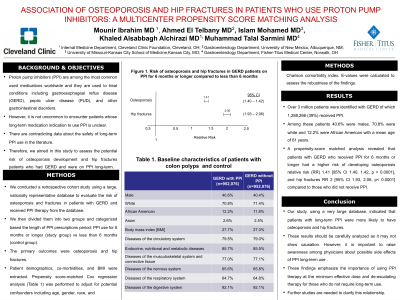Sunday Poster Session
Category: Esophagus
P0497 - Association of Osteoporosis and Hip Fractures in Patients Who Use Proton Pump Inhibitors: A Multicenter Propensity Score Matching Analysis
Sunday, October 27, 2024
3:30 PM - 7:00 PM ET
Location: Exhibit Hall E

Has Audio

Mounir Ibrahim, MD
Cleveland Clinic Foundation
Holmdel, NJ
Presenting Author(s)
Mounir Ibrahim, MD1, Ahmed El Telbany, MD, MPH2, Islam Mohamed, MD3, Khaled Alsabbagh Alchirazi, MD4, Muhammad Sarmini, MD5
1Cleveland Clinic Foundation, Holmdel, NJ; 2University of New Mexico, Albuquerque, NM; 3University of Missouri - Kansas City School of Medicine, Kansas City, MO; 4Aurora Healthcare, Milwaukee, WI; 5Fisher Titus Medical Center, Avon, OH
Introduction: Proton pump inhibitors (PPI) are widely prescribed medications. They are commonly used to treat conditions including gastroesophageal reflux disease (GERD), peptic ulcer disease (PUD), and various other gastrointestinal disorders. Most often patients are prescribed PPI on a long-term basis. There have been studies that suggested a potential link between long-term PPI use and the development of osteoporosis and fractures. In this study, we aim to investigate the risk of osteoporosis and fractures in patients who use PPI.
Methods: We conducted a retrospective cohort study using a large, nationally representative database to evaluate the risk of osteoporosis and fractures in patients with GERD who received PPI compared to those who did not. We identified patients with GERD from the database and categorized them into PPI users and non-users. The primary outcomes were osteoporosis and fractures. Patient demographics, co-morbidities, and BMI were extracted. Propensity score-matched Cox regression analysis (Table 1) was performed to adjust for potential confounders including age, gender, race, and Charlson comorbidity index. E-values were calculated to assess the robustness of the findings.
Results: Over 3 million patients were identified with GERD of which 1,288,266 (39%) received PPI. Among these patients 40.6% were males, 70.8% were white and 12.2% were African American with a mean age of 61 years. A propensity-score matched analysis revealed that patients with GERD who received PPI had a higher risk of developing osteoporosis relative risk (RR) 1.41 [95% CI 1.40, 1.42, p < 0.0001], and fractures RR 2 [95% CI 1.93, 2.06, p< 0.0001] compared to those who did not receive PPI.
Discussion: Our study, using a very large database, indicated that patients with PPI were more likely to have osteoporosis and hip fractures. These results should be carefully analyzed as it may not show causation. However, it is important to raise awareness among physicians about possible side effects of PPI long term use. Therefore, it is important to assess if patients need long-term therapy to avoid unnecessary complications. Further studies are needed to clarify this relationship and clarify the relationship
Note: The table for this abstract can be viewed in the ePoster Gallery section of the ACG 2024 ePoster Site or in The American Journal of Gastroenterology's abstract supplement issue, both of which will be available starting October 27, 2024.
Disclosures:
Mounir Ibrahim, MD1, Ahmed El Telbany, MD, MPH2, Islam Mohamed, MD3, Khaled Alsabbagh Alchirazi, MD4, Muhammad Sarmini, MD5. P0497 - Association of Osteoporosis and Hip Fractures in Patients Who Use Proton Pump Inhibitors: A Multicenter Propensity Score Matching Analysis, ACG 2024 Annual Scientific Meeting Abstracts. Philadelphia, PA: American College of Gastroenterology.
1Cleveland Clinic Foundation, Holmdel, NJ; 2University of New Mexico, Albuquerque, NM; 3University of Missouri - Kansas City School of Medicine, Kansas City, MO; 4Aurora Healthcare, Milwaukee, WI; 5Fisher Titus Medical Center, Avon, OH
Introduction: Proton pump inhibitors (PPI) are widely prescribed medications. They are commonly used to treat conditions including gastroesophageal reflux disease (GERD), peptic ulcer disease (PUD), and various other gastrointestinal disorders. Most often patients are prescribed PPI on a long-term basis. There have been studies that suggested a potential link between long-term PPI use and the development of osteoporosis and fractures. In this study, we aim to investigate the risk of osteoporosis and fractures in patients who use PPI.
Methods: We conducted a retrospective cohort study using a large, nationally representative database to evaluate the risk of osteoporosis and fractures in patients with GERD who received PPI compared to those who did not. We identified patients with GERD from the database and categorized them into PPI users and non-users. The primary outcomes were osteoporosis and fractures. Patient demographics, co-morbidities, and BMI were extracted. Propensity score-matched Cox regression analysis (Table 1) was performed to adjust for potential confounders including age, gender, race, and Charlson comorbidity index. E-values were calculated to assess the robustness of the findings.
Results: Over 3 million patients were identified with GERD of which 1,288,266 (39%) received PPI. Among these patients 40.6% were males, 70.8% were white and 12.2% were African American with a mean age of 61 years. A propensity-score matched analysis revealed that patients with GERD who received PPI had a higher risk of developing osteoporosis relative risk (RR) 1.41 [95% CI 1.40, 1.42, p < 0.0001], and fractures RR 2 [95% CI 1.93, 2.06, p< 0.0001] compared to those who did not receive PPI.
Discussion: Our study, using a very large database, indicated that patients with PPI were more likely to have osteoporosis and hip fractures. These results should be carefully analyzed as it may not show causation. However, it is important to raise awareness among physicians about possible side effects of PPI long term use. Therefore, it is important to assess if patients need long-term therapy to avoid unnecessary complications. Further studies are needed to clarify this relationship and clarify the relationship
Note: The table for this abstract can be viewed in the ePoster Gallery section of the ACG 2024 ePoster Site or in The American Journal of Gastroenterology's abstract supplement issue, both of which will be available starting October 27, 2024.
Disclosures:
Mounir Ibrahim indicated no relevant financial relationships.
Ahmed El Telbany indicated no relevant financial relationships.
Islam Mohamed indicated no relevant financial relationships.
Khaled Alsabbagh Alchirazi indicated no relevant financial relationships.
Muhammad Sarmini indicated no relevant financial relationships.
Mounir Ibrahim, MD1, Ahmed El Telbany, MD, MPH2, Islam Mohamed, MD3, Khaled Alsabbagh Alchirazi, MD4, Muhammad Sarmini, MD5. P0497 - Association of Osteoporosis and Hip Fractures in Patients Who Use Proton Pump Inhibitors: A Multicenter Propensity Score Matching Analysis, ACG 2024 Annual Scientific Meeting Abstracts. Philadelphia, PA: American College of Gastroenterology.
